This guide contains my recommended books on deliberate practice. They are worth reading if you would like to strengthen your skills in anything, from learning to work performance, solving Rubik’s cubes, or thinking.
If you do not know what deliberate practice is, read my other articles: Anders Ericsson’s deliberate practice here or How-to Guide to Deliberate Practice.
Well, without further ado, let’s dive in.
The Cambridge Handbook on Expertise and Expert Performance
The Cambridge Handbook on Expertise and Expert Performance is my reference book on deliberate practice and expert performance. The 943 pages of the second edition make the handbook one of the most comprehensive materials about the subject. The topics it covers include:
- Perspectives on the acquisition of expertise by human beings and animals;
- Theories and methods used to study expertise;
- Methods for studying the structure of expertise;
- Methods of studying the acquisition and maintenance of expertise;
- Domains of expertise, i.e., profession, arts, sports, games
- Mechanisms mediating types of expertise
- General issues and theoretical frameworks
The handbook covers a wide range of expertise. The professional domains of expertise include medicine and surgery, transportation, professional design, entrepreneurial ability, writing, teaching, decision-making, numeracy, and team expertise. Music, drawing, chess, math, second language, and sports fall under the expertise domain of arts, sports, games, and other skills.
If you look to improve performance in any of these skill types, then give it a try: The Cambridge Handbook on Expertise and Expert Performance.
Peak: Secrets from New Science of Expertise
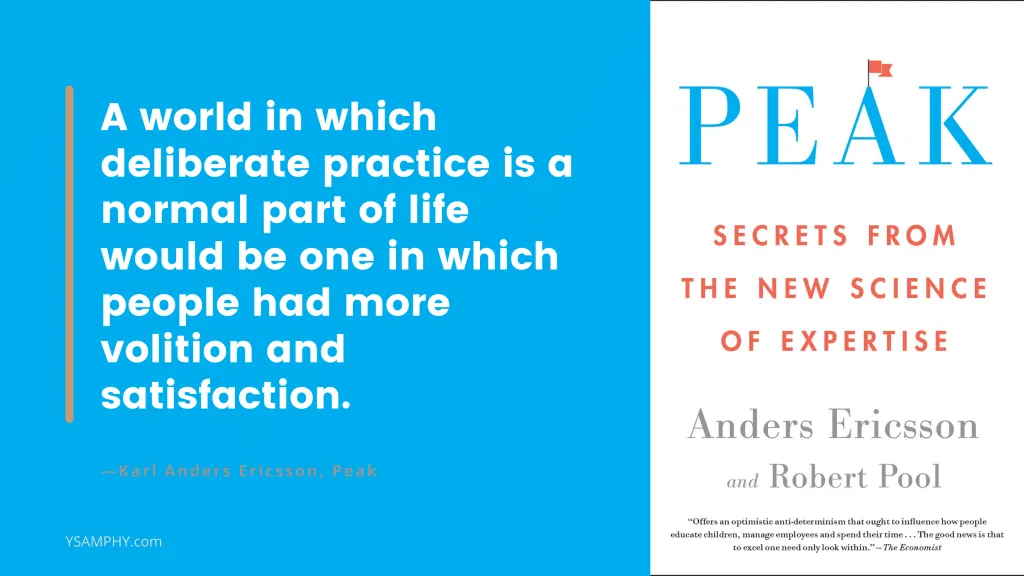
Professor K. Anders Ericsson, the author of Peak: Secrets from New Science of Expertise, is one of the most prominent figures in the study of expert performance. He has studied the subject for several decades now. Below are only some of his research papers:
Here are some of the articles that Ericsson has published about deliberate practice for your further reading.
- Ericsson, K. A., Krampe, R. T., & Tesch-Römer, C. (1993). The role of deliberate practice in the acquisition of expert performance. Psychological Review, 100(3), 363. https://psycnet.apa.org/buy/1993-40718-001
- Ericsson, K. A., and Charness, N. (1994). Expert performance: its structure and acquisition. Am. Psychol. 49, 725–747. doi: 10.1037/0003-066X.49.8.725
- Ericsson, K. A. (1996). “The acquisition of expert performance: an introduction to some of the issues,” in The Road to Excellence: The Acquisition of Expert Performance in the Arts and Sciences, Sports, and Games, ed. K. A. Ericsson, (Mahwah, NJ: Erlbaum), 1–50.
- Ericsson, K. A., and Pool, R. (2016). Peak: Secrets from the New Science of Expertise. New York, NY: Houghton Mifflin & Harcourt.
- Ericsson, K. A. (1998). The scientific study of expert levels of performance: general implications for optimal learning and creativity. High Ability Stud. 9, 75–100. doi: 10.1080/1359813980090106
- Ericsson, K. A. (2003). “How the expert-performance approach differs from traditional approaches to expertise in sports: in search of a shared theoretical framework for studying expert performance,” in Expert Performance in Sport: Recent Advances in Research on Sport Expertise, eds J. Starkes, and K. A. Ericsson, (Champaign, IL: Human Kinetics), 371–401.
- Ericsson, K. A. (2007). Deliberate practice and the modifiability of body and mind: toward a science of the structure and acquisition of expert and elite performance. Int. J. Sport Psychol. 38, 4–34.
- Ericsson, K. A. (2013). Training history, deliberate practice and elite sports performance: an analysis in response to Tucker and Collins Review – “What makes champions?”. Br. J. Sports Med. 47, 533–535. doi: 10.1136/bjsports-2012-091767
- Ericsson, K. A. (2014). Why expert performance is special and cannot be extrapolated from studies of performance in the general population: a response to criticisms. Intelligence 45, 81–103. doi: 10.1016/j.intell.2013.12.001
- Ericsson, K. A. (2016). Summing up hours of any type of practice versus identifying optimal practice activities: comments on Macnamara, Moreau, and Hambrick (2016). Perspect. Psychol. Sci. 11, 351–354. doi: 10.1177/1745691616635600
- Ericsson, K. A., and Pool, R. (2016). Peak: Secrets from the New Science of Expertise. New York, NY: Houghton Mifflin & Harcourt.
- Ericsson, K. A., Hoffman, R. R., Kozbelt, A., and Williams, A. M. (eds) (2018). Revised Edition of Cambridge Handbook of Expertise and Expert Performance. Cambridge: Cambridge University Press.
- Ericsson, K. A. (2018a). “Capturing expert thought with protocol analysis: Concurrent verbalizations of thinking during experts’ performance on representative tasks,” in Revised Edition of Cambridge Handbook of Expertise and Expert Performance, 2nd Edn, eds K. A. Ericsson, R. R. Hoffman, A. Kozbelt, and A. M. Williams, (Cambridge: Cambridge University Press), 192–212. doi: 10.1017/9781316480748.012
- Ericsson, K. A. (2018b). “Superior working memory in experts,” in Revised Edition of Cambridge Handbook of Expertise and Expert Performance, 2nd Edn, eds K. A. Ericsson, R. R. Hoffman, A. Kozbelt, and A. M. Williams, (Cambridge: Cambridge University Press), 696–713. doi: 10.1017/9781316480748.036
- Ericsson, K. A. (2018c). “The differential influence of experience, practice, and deliberate practice on the development of superior individual performance of experts,” in Revised Edition of Cambridge Handbook of Expertise and Expert Performance, 2nd Edn, eds K. A. Ericsson, R. R. Hoffman, A. Kozbelt, and A. M. Williams, (Cambridge: Cambridge University Press), 745–769. doi: 10.1017/9781316480748.038
- Ericsson, K. A., & Harwell, K. W. (2019). Deliberate practice and proposed limits on the effects of practice on the acquisition of expert performance: Why the original definition matters and recommendations for future research. Frontiers in psychology, 10, 2396. https://www.frontiersin.org/articles/10.3389/fpsyg.2019.02396/full
- Ericsson, K. A. (2020). Towards a science of the acquisition of expert performance in sports: Clarifying the differences between deliberate practice and other types of practice. Journal of sports sciences, 38(2), 159-176. https://bit.ly/3i4tCff
Peak: Secrets from New Science of Expertise discusses the principles of deliberate practices on the job and everyday life and shares advice on how to get started and attain elite performance.
The Art of Learning: An Inner Journey to Optimal Performance
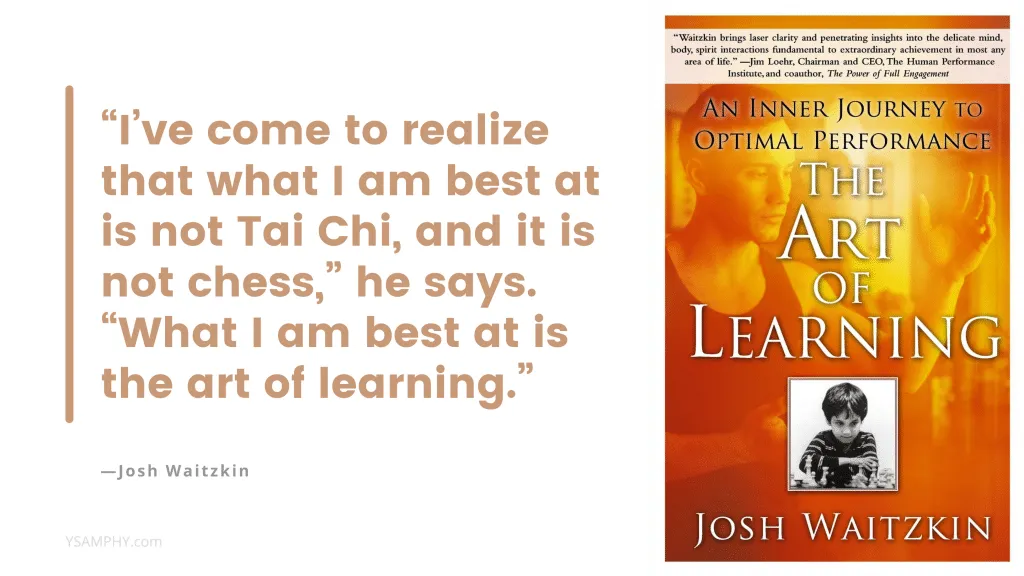
In the book, The Art of Learning: An Inner Journey to Optimal Performance, Josh Waitzkin shares his principles of learning and performance that he used to win his first National Chess Championship at the age of nine and the World Champion of Tai Chi.
The first section of the book lays the foundation for learning. It is about how to get started and go through the dips and valleys of the learning curves. The second part introduces the learning principles, and the last part brings together all the principles and taking them to the next level.
“I’ve come to realize that what I am best at is not Tai Chi, and it is not chess,” he says. “What I am best at is the art of learning.”
So, if you have the same belief in the role of learning ability in your performance on the job and in life, I recommend that you grab this deliberate practice book and deliberately practicing the principles Waitzkin shares.
Make It Stick: The Science of Successful Learning
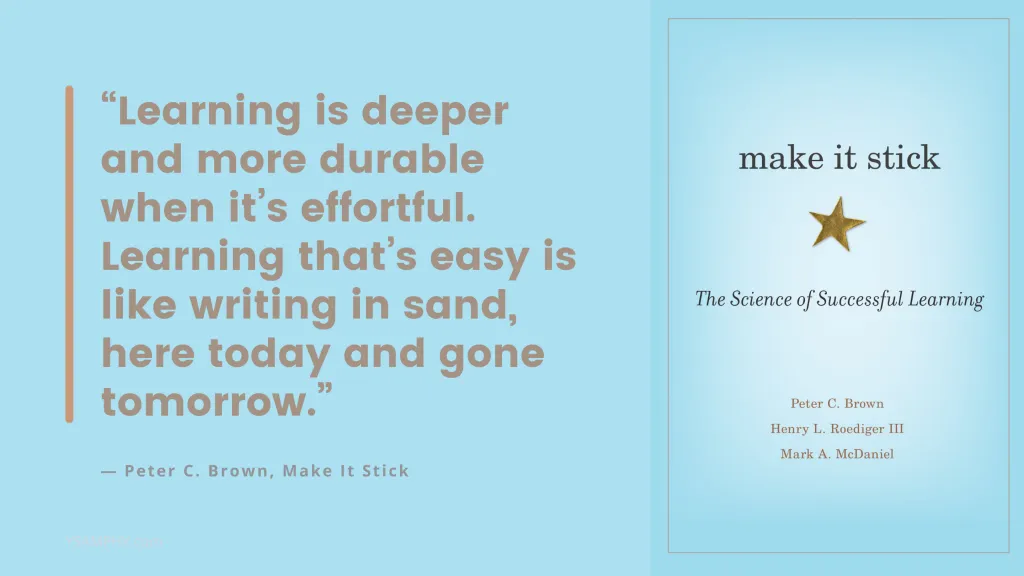
Make it Stick: The Science of Successful Learning has been my go-to deliberate practice book for learning for a while now. In fact, it was this book that got me to dig deeper into the subject.
The proposition of the book is this:
“Learning is deeper and more durable when it’s effortful. Learning that’s easy is like writing in sand, here today and gone tomorrow.” ― Peter C. Brown, Make It Stick
All the learning methods and techniques such as spacing, interleaving, and retrieval practice that Professor Brown advises in the book require effortful practice. Self-quizzing, note-taking, elaboration, reflection, mnemonic, and visualization all embody the principles of deliberate practice.
If you want to master the art of learning, Make It Stick should also be on your bookshelf (or your Kindle library).
Mastery
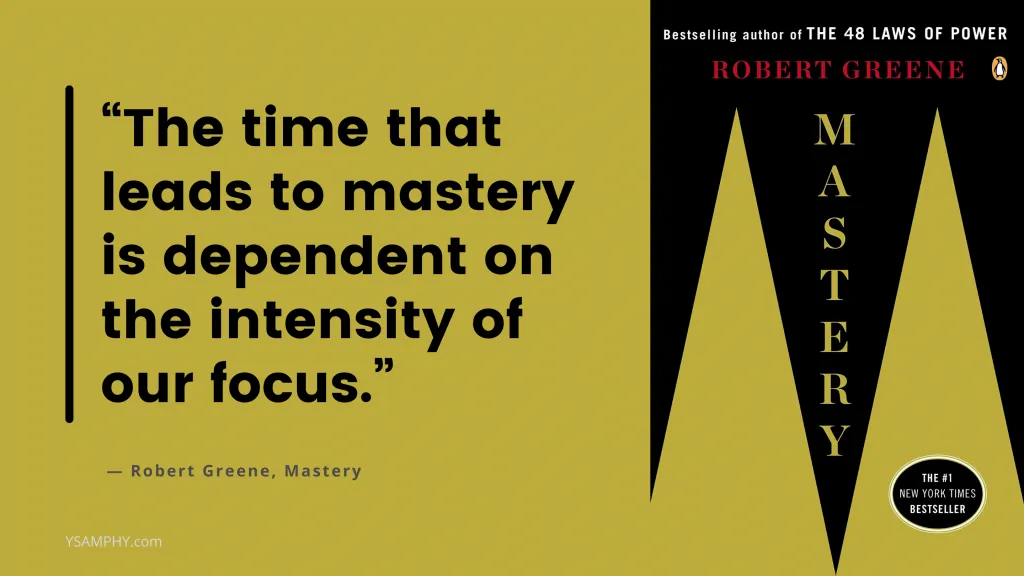
Mastery is the #1 New York Times Bestseller. It is an easy read for busy professionals. Each idea and topic is a quick read of a few pages.
In this deliberate practice book, Robert Greene shared his advice on finding your why and developing the right practices for attaining mastery. Similarly to a characteristic of deliberate practice, Mastery recommends the role of a mentor in mastering a skill. It discusses the behaviors of Albert Einstein, Charles Darwin, Leonardo da Vinci. Greene also interviewed nine other experts for the book.
The book lays the foundation of why mastery is essential. Also, it does a beautiful job of advising on tackling the challenges people face on the path to mastery and provides a thorough and proven roadmap on each step of the way.
Mastery could change the way you view your work and be your best go-to book. I also recommend it to find your life’s purpose and develop a path to mastery.
Deep Work: Rules for Focused Success in a Distracted World
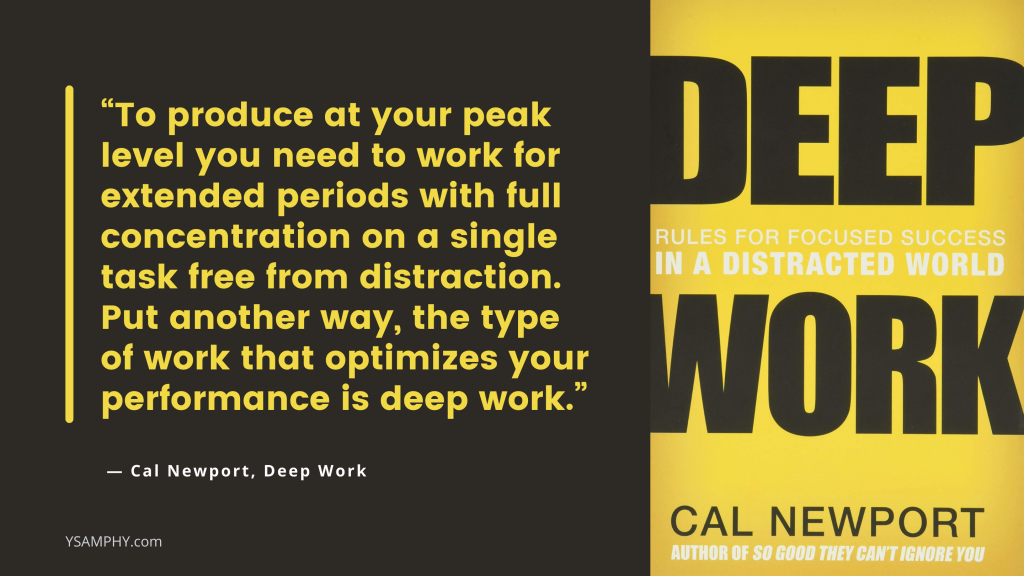
Deep Work: Rules for Focused Success in a Distracted World should be a go-to book on deliberate practice for knowledge workers. In fact, deep work could constitute deliberate practice.
The book teaches you the rare and valuable skills you can use to build your career capital. The author Cal Newport also presents persuasive arguments as to why the way most people work with constant distractions from social media is holding them back from building a successful career.
You will learn about some strategies and examples of how to incorporate deep work into your schedule. Bill Gates Think Week is just one of many examples. Newport also signals why you should be prepared to embrace boredom as a result of doing deep work. Finally, the advice in the book about how to eliminate shallow work and social media distractions is valuable, too.
In short, Deep Work is an inspiring guide to working much better.
That’s it.
Over to You
Did I miss out on your favorite deliberate practice book? Or of those that I recommend here, which one will you read first?
Let me know.


Fantastic article and great resources. These books are at the top of my list now, thank you for this!
I’m glad you find them useful. Please do recommend others if I miss out on your favourite ones.